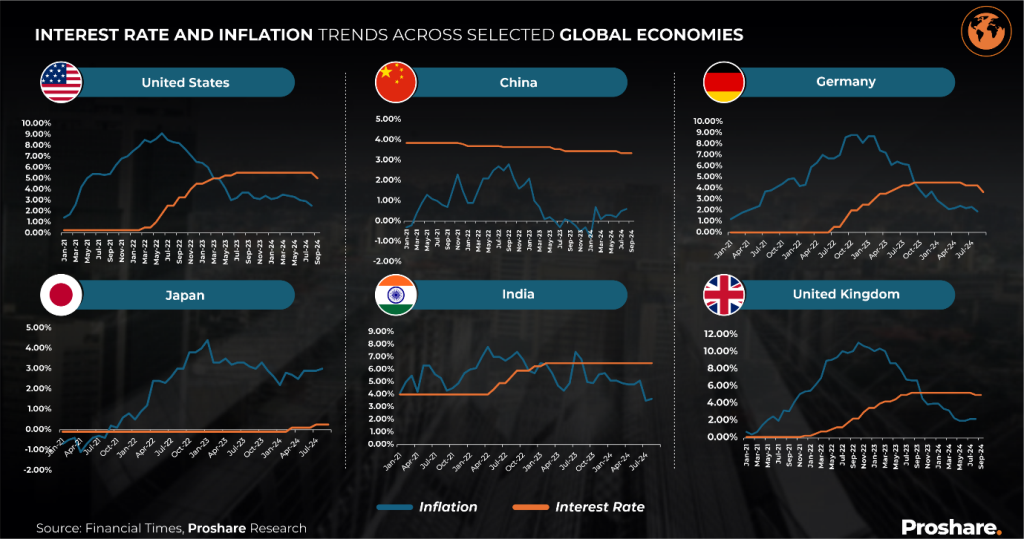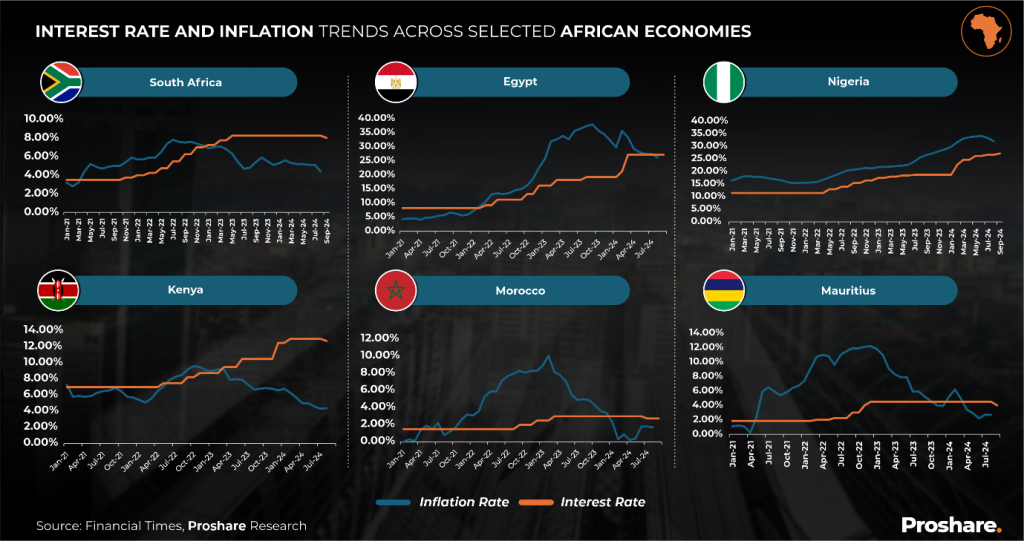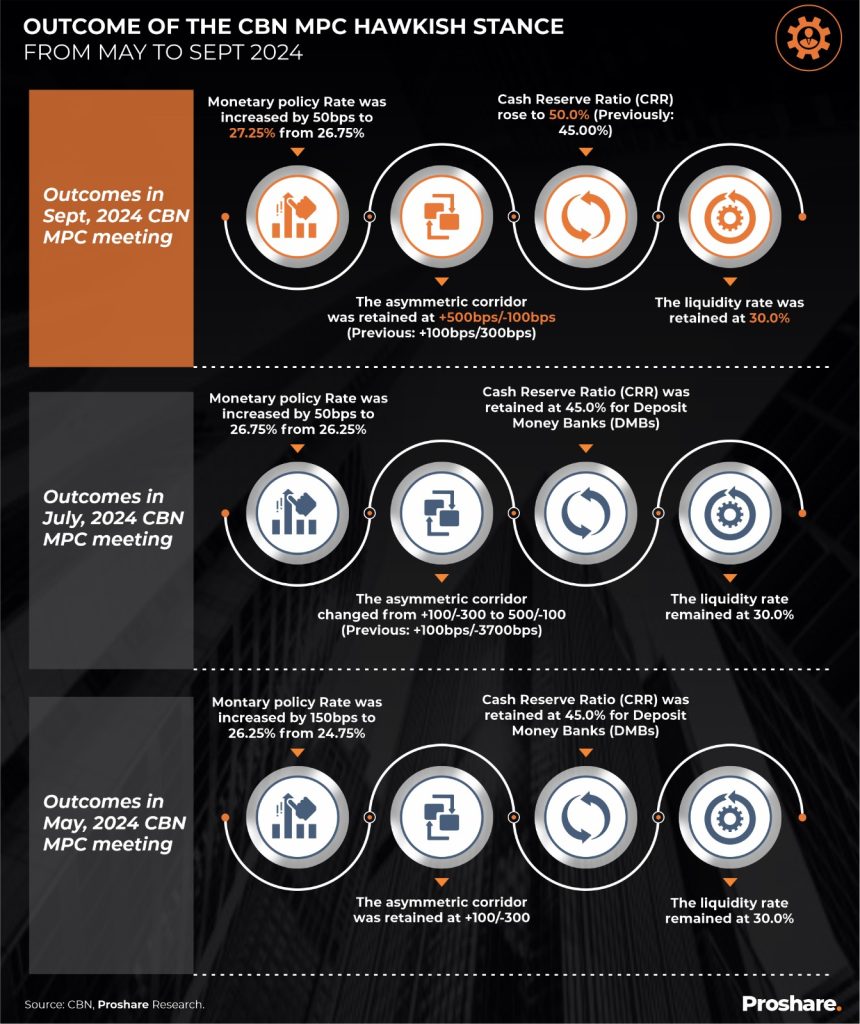Post CBN MPC Decision: The Fire Next Time

Analysts Key Views
. The CBN MPC unanimously retained its Hawkish stance in its September 26, 2024, meeting, tightening by another 50bps to take the MPR up to 27.25%.
. Proshare analysts anticipate the CBN MPC’s hawkish conditions will prevail for the rest of the year.
. Our relatively hawkish outlook hinges on inflation rates currently averaging 30% in 2024, weak exchange rate amidst import dependence for raw materials, and structural drivers affecting prospects for inflation moderation.
Global Market Policy Rate Conditions
Global policy rates averaged 3.96% in September 2024, down from 4.18 in September 2023 but above 2.01% in 2022 across the ten largest economies tracked by Proshare analysts. The CFR Global Monetary Policy Tracker reveals that Global Easing (-)/Tightening (+) conditions have cooled, moving from -2.46/10 as of October 1, 2024, 2023, to -8.60/10 on October 1, 2024, representing a major global monetary easing as global inflationary pressures moderate.
Following the Fed rate cut on September 18, 2024, by 50bps to 4.88% from 5.38%, the ECB cut its rates for the second time in 2024 by another 25bps to 3.5% from 3.75% as cheaper energy prices loosened inflationary pressures to 1.8% in September 2024 from 2.2% in August 2024. The UK BoE maintained its rate at 5% while Canada’s BoC eased rates by 25bps to 4.25% from 4.5% (see Chart 1 below).
Chart 1:

Asian markets continue to face deflationary conditions, falling productivity, low demand, and a property crisis in China. Japan’s Central Bank, the Bank of Japan (BoJ) rate hike and interventions strengthened the Yen. It unwound the Yen carry trade for August, leaving major markets unsettled and bearish and heightening prospects of a recession in the US economy.
The People’s Bank of China (PBoC) has kept rates at 3.35%. The Chinese government’s monetary and fiscal stimulus for its weakened capital markets and households has seen a surge in share buybacks in the Chinese markets. We believe this condition will be viable in lifting the Chinese markets from their weak levels but unsustainable in restoring growth to the 5% target.
African Markets Policy Rate Conditions
In Africa, many Central Banks have taken independent calls. South Africa saw its first rate cut in September 2024, with the South Africa Reserve Bank (SARB) reducing its prime lending rates to 11.50% from 11.75%. Egypt’s CBE held its primary operation rate at 27.75%, while Nigeria’s Central Bank (CBN) hiked its policy rate by 50bps to 27.25% from 26.75%.
Africa’s Policy rate easing cycles have moved slower than global easing conditions, with policy rates averaging 13.85% from 10.71% in Africa’s top ten largest economies. Analysts believe these imbalances and misalignments in policy rate direction will persist through Q4 2024 (see Chart 2 below).
Chart 2:

Why the CBN Raised the Policy Rate
“Members deliberated on the optimal policy option to sustain the downward trend in price development, contain emerging risks to inflation, stabilise the exchange rate and safeguard the banking system while also shielding the recovery of output growth.” – CBN MPC
The MPC unanimously tightened policy rates, surprising the market with another 50bps hike, bringing the total number of policy rate hikes in 2024 to 850bps. Inflation, on the other hand, has remained untamed (see illustration 1 below).
Illustration 1:

In hiking rates, the CBN MPC noted that it considered the following:
- The moderation in headline inflation in July and August 2024 and risks to counterbalance these moderations, such as energy cost.
- Money supply growth
- Higher fiscal deficits
- Strong correlation between FAAC releases and liquidity levels in the banking system
- Stable and converged exchange rates across market segments needed to be maintained
- Flood risks, insecurity, energy cost, and PMS scarcity as food inflation drivers.
- The MPC’s concern for medium and long-term outcomes rather than immediate gains alone.
Closing Thought: Outlook/the Next Fire
- The prospects for the CBN’s considerations being adequately addressed in the coming months remain highly uncertain.
· Proshare analysts anticipate that similar considerations will arise at the next meeting.
· We expect an additional interest rate increase of at least 25 basis points this year, reflecting the CBN MPC’s continued hawkishness and commitment to inflation-targeting.
· We represent that the CBN policy hike may be necessary but ineffective in reducing inflation risks driven by structural factors such as insecurity, climate risks, PMS scarcity, and energy costs.
· The CBN considerations were muted on the influence of critical data in its policy decision, such as the labour market data (unemployment) and PMI.
· The CBN has indicated that its interest rate policies have contributed to stabilising the exchange rate; however, our in-house analysts advocate for a shift in focus towards strengthening the naira through increased foreign direct investment (FDI) rather than foreign portfolio investments (FPIs), alongside reserve accumulation and enhanced balance sheet performance.
· Our analysts contend that monetary and fiscal authorities must act with greater urgency/aggression and decisiveness to ensure that policies are formulated and yield positive outcomes for households and businesses, thereby fostering a more predictable and transparent economic environment.




